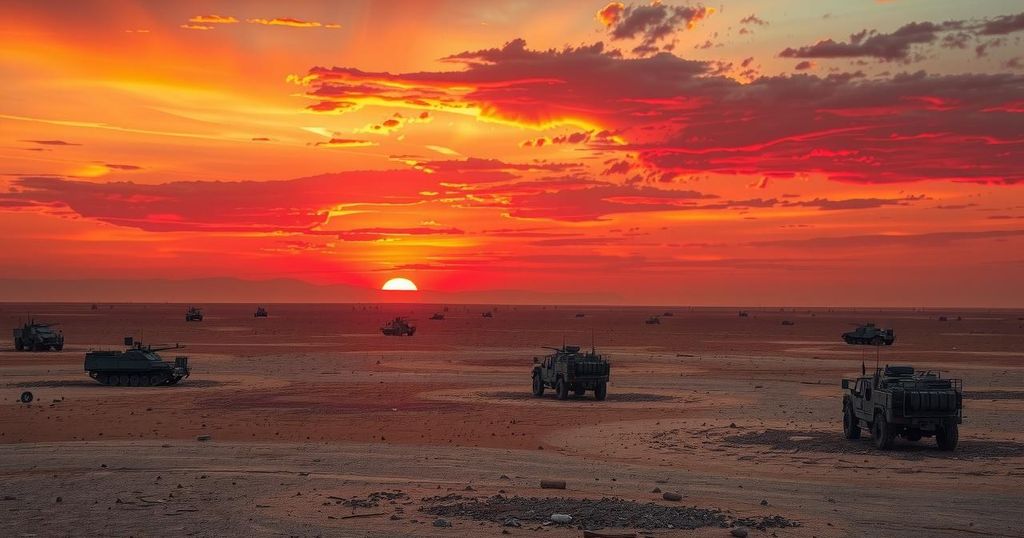Involvement of Romanian Mercenaries in DRC Conflict Raises Concerns
Over 280 men, alleged to be Romanian mercenaries, have surrendered to the M23 rebels in the DRC after the capture of Goma. Their involvement reflects the DRC government’s lack of preparedness, raising concerns over escalating violence. Authorities are now exploring diplomatic channels as regional tensions worsen.
Reports indicate that over 280 individuals, allegedly identified as “Romanian mercenaries” by the Rwanda Defense Force (RDF), have surrendered to the M23 rebels in the Democratic Republic of the Congo (DRC). After the rebels captured the Congolese city of Goma, these individuals are being escorted to Kigali, as disclosed in a post on X, formerly Twitter. However, independent verification regarding their nationality and combat status remains unconfirmed by Newsweek.
The involvement of purported Romanian mercenaries suggests that the DRC government felt ill-prepared to combat the M23 rebels independently as tensions escalate in the region. The M23’s takeover of Goma marks a significant military advancement, likely inciting further violence and exacerbating regional instability amid the deteriorating relations between the DRC and Rwanda.
The RDF states that these “mercenaries” were cooperating with the Armed Forces of the Democratic Republic of the Congo (FARDC) in efforts to defend eastern DRC’s borders with Rwanda. Although initially contracted for military assistance, they are now set to return home upon their arrival in Kigali, as reported by Reuters.
The Romanian Ministry of Foreign Affairs has officially acknowledged the presence of Romanian civilians and military trainers in the DRC, clarifying their roles as part of a training mission for the DRC’s armed forces. These individuals are reportedly affiliated with a private military organization led by Horațiu Potra, tasked with aiding the DRC in countering the M23 insurgency.
Civil unrest in the DRC has intensified in recent weeks, with protesters targeting various foreign embassies amid the ongoing conflict. The protests have involved actions such as looting and vandalism, reflecting growing discontent regarding foreign involvement and internal governance. The United Nations and U.S. assert that the M23’s aggression is allegedly supported by Rwanda, which the latter has denied, claiming to have troops in Eastern Congo for security maintenance.
The M23, largely comprising ethnic Tutsi members, successfully seized Goma on January 27. The Congolese government has categorized this advance as a “declaration of war,” underscoring the escalating military engagement in the region. As a response, the East African Community is slated to convene an emergency summit to address these developments.
As opinions on social media draw attention to the situation, journalists and officials express varied perspectives. Mélanie Gouby remarked on the portrayal of mercenaries in light of their return to Romania, while governmental representatives like Arthur Asiimwe emphasize Rwanda’s need for defensive measures. Some commentators highlight the DRC’s historical reliance on foreign mercenaries and call for peaceful resolutions rather than military confrontation.
The DRC’s situation remains complex, with both immediate and long-term implications for the region. The actions of the M23, the response of the DRC government, and international involvement will significantly influence the potential for stability and peace in the area.
In summary, the surrender of purported Romanian mercenaries to the M23 rebels highlights the escalating tensions and challenges faced by the DRC government amid its ongoing conflict. The developments not only reveal the reliance on foreign forces for military support but also raise critical questions about the role of regional diplomacy. The situation merits close observation as the East African Community prepares for an emergency summit to address the crisis, with outcomes that could shape the region’s stability moving forward.
Original Source: www.newsweek.com




Post Comment